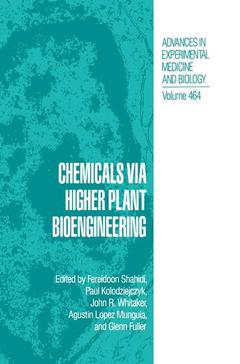Chemicals via Higher Plant Bioengineering, Softcover reprint of the original 1st ed. 1999 Advances in Experimental Medicine and Biology Series, Vol. 464
Langue : Anglais
Coordonnateurs : Shahidi Fereidoon, Kolodziejczyk Paul, Whitaker John R., Lopez Munguia Agustin, Fuller Glenn

Food and raw material for its production was generally produced via the traditional agriculture. On the other hand, novel chemicals were manufactured in the laboratory or extracted from plant and animal sources. However, as the world population is steadily in creasing, there is a decrease in traditional agriculture productivity and concerns are also expressed over the damage inflicted to the environment and restrictions that might be en forced in food production. At the same time, there is an increasing demand for high qual ity agricultural products as well as for food ingredients related to both the traditional or newly discovered nutrients or phytochemicals. Trends and developments,~n the area of plant biotechnology and bioengineering has allowed manipulation of genes' !lnd/or insertion of new genes, thus production of trans genic plants. Starting from the introduction of agronomic traits, particularly stress resis tance to diverse environmental factors, process and sensory characteristics, food quality and production of novel varieties of plant-based products through genetic engineering, biotechnology is changing the,;agriculture and the concept of production of plant-ba~~d raw materials. Increasing attention is being paid on research for production of plants !pat can provide a wide array of food and non-food products. Perhaps the first non-food pro,d uct that plant biotechnology would achieve is production of large scale custom-designed industrial oils, but the list of chemicals is long, ranging" from oils and specific triacyl glycerols to biopolymers, enzymes, blood components, amo~g others.
1. Novel Chemicals from Plants via Bioengineering.- 2. Recent Progress in Agricultural Biotechnology and Opportunities for Contract Research and Development.- 3. Manipulation of Plant Oil Composition for the Production of Valuable Chemicals.- 4. Biosynthesis of Ricinoleate in Castor Oil.- 5. Monoterpenes in Essential Oils.- 6. Biochemical and Molecular Tools for the Production of Useful Terpene Products from Pepper(Capsicum annuum).- 7. Towards the Production of Salt-Tolerant Crops.- 8. Combinatorial Chemistry and Its Applications in Agriculture and Food.- 9. Biological Nitrogen Fixation and Future Challenges of Agriculture.- 10. Molecular Strategies to Improve the Nutritional Quality of Legume Proteins.- 11. Molecular Farming of Industrial Proteins from Transgenic Maize.- 12. Improvements in Human Health through Production of Human Milk Proteins in Transgenic Food Plants.- 13. Food Plant-Delivered Cholera Toxin B Subunit for Vaccination and Immunotolerization.- 14. Autoantigens Produced in Plants for Oral Tolerance Therapy of Autoimmune Diseases.- 15. Production of Food Related Colorants by Culture of Plant Cells.- 16. Production of Recombinant Blood Factors in Transgenic Plants.- 17. Recent Progress in Biotechnology of Mexican Medicinal Plants.- 18. Chemicals from Roots, Hairy Roots, and Their Application.
Date de parution : 10-2012
Ouvrage de 280 p.
15.5x23.5 cm
Thèmes de Chemicals via Higher Plant Bioengineering :
© 2024 LAVOISIER S.A.S.



